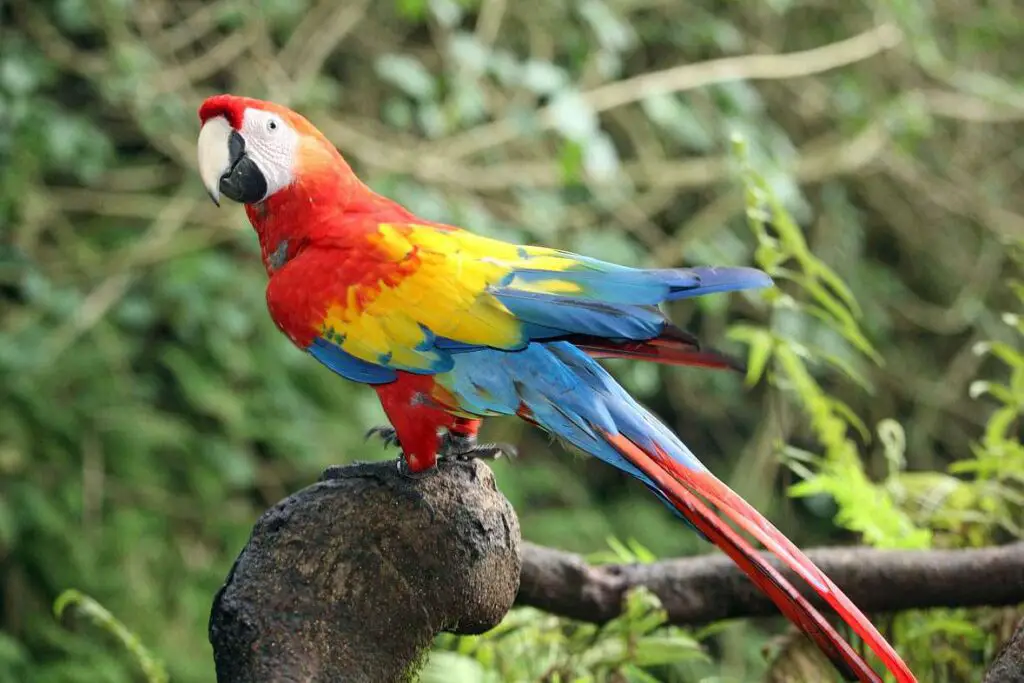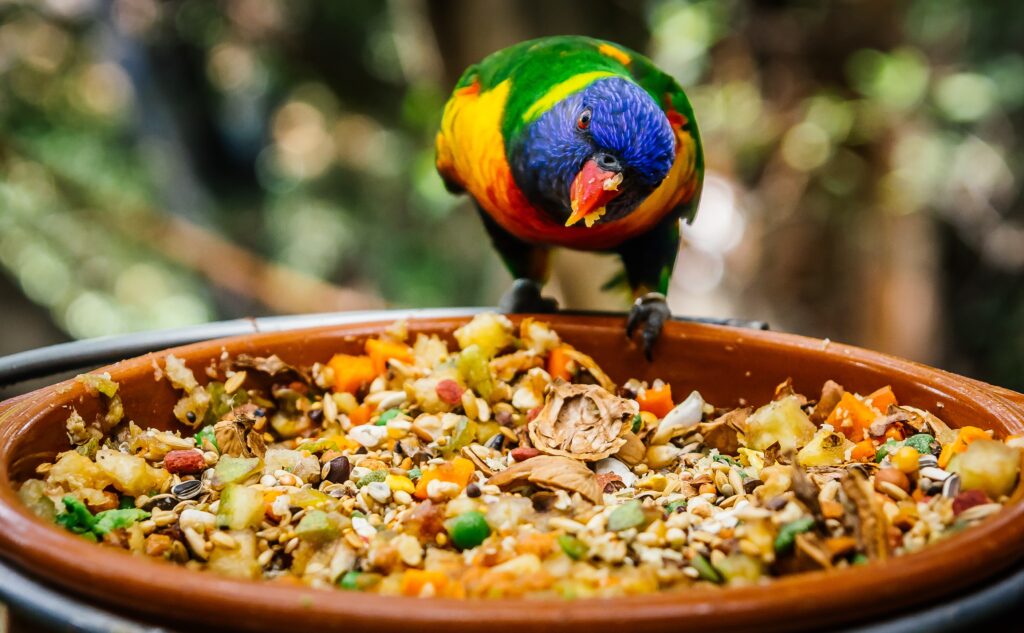Table of Contents
ToggleIntroduction
Famous for their colourful feathers and friendly demeanour, parrots make wonderful pets and are popular among bird watchers worldwide. Can Parrots Have Raisins? Their varied dietary requirements, impacted by species, size, and overall health factors, underline the necessity of maintaining a well-rounded and species-appropriate diet. A parrot’s diet consists primarily of seeds, fruits, and vegetables, yet the addition of goodies like raisins raises interesting questions about the dietary value of the diet overall. This study aims to investigate the nutritional value of raisins and the suitability of these dried fruits for the avian digestive system to solve the mystery of their inclusion in a parrot’s diet.
Raisin Composition Overview
Caloric Density: Raisins are energy-dense, packing a significant caloric punch. This characteristic can benefit parrots, especially those with higher energy requirements. However, moderation is key to preventing excessive calorie intake, as obesity poses potential health risks.
Natural Sugars: The natural sugars in raisins, primarily glucose and fructose, provide a quick energy boost. For parrots engaging in high-energy activities, such as flying or playful antics, the sugars in raisins can serve as a rapid energy source.
Fibre Content: Rich in dietary fibre, raisins contribute to digestive health in parrots. Fiber aids in maintaining optimal gut function, preventing constipation, and promoting a healthy balance of the avian digestive system.
Vitamins and Minerals: Raisins harbour a spectrum of essential vitamins and minerals, including potassium, iron, and certain B vitamins. These micronutrients are pivotal in maintaining overall health, supporting metabolic processes, and fortifying the immune system.
Potential Benefits For Parrots
Antioxidant Properties: Raisins are laden with antioxidants, such as polyphenols, which combat oxidative stress. In parrots, antioxidants may bolster immune function and mitigate aging effects, providing a potential longevity boost.
Natural Sweetness and Palatability: Parrots, known for their discerning tastes, often appreciate the natural sweetness of raisins. Including raisins in their diet can serve as a wholesome treat, making it easier for pet owners to diversify their feathered companion’s culinary experience.
Supporting Cardiovascular Health: The potassium content in raisins contributes to cardiovascular health by helping regulate blood pressure. The moderate inclusion of raisins may offer cardiovascular support for parrots prone to heart-related issues.
Diverse Nutrient Profile: The array of vitamins and minerals in raisins contributes to a well-rounded nutrient profile. Integrating these dried fruits into a balanced diet for parrots ensures a diverse array of essential nutrients, promoting overall health and vitality.
Raisin Sugar
High Natural Sugar Concentration: While the natural sugars in raisins can provide a quick energy boost, the high concentration of sugars, mainly glucose and fructose, raises concerns. Excessive sugar intake can contribute to weight gain, metabolic issues, and dental problems in parrots. Careful consideration of the overall sugar content in a parrot’s diet is crucial to prevent potential health complications.
Risk of Hyperglycemia: Parrots may be susceptible to fluctuations in blood sugar levels. The rapid spike in blood sugar caused by consuming sugary treats like raisins can pose a risk of hyperglycemia. Monitoring the frequency and quantity of raisin intake is essential to avoid adverse effects on a parrot’s metabolic health.
Possible Choking Hazard
Size and Consistency: Raisins, being small and chewy, present a potential choking hazard for parrots, especially smaller species. The sticky nature of raisins can adhere to the bird’s beak or throat, increasing the risk of choking. Owners should be vigilant and consider the size and texture of raisins about their bird’s size and beak structure.
Preventive Measures: To reduce the danger of choking, slice raisins into smaller, easier-to-handle pieces or soak them quickly in water to alter their texture. Supervised consumption and understanding the individual bird’s chewing habits can further reduce the likelihood of choking incidents.
Weight And Health Impact
Caloric Density and Obesity Risk: The caloric density of raisins, while providing energy, can contribute to weight gain if not monitored. Obesity in parrots is linked to various health issues, including cardiovascular problems and reduced life expectancy. Owners should factor in the additional calories from raisins when planning their birds’ overall diet.
Balanced Approach: Incorporating raisins should be part of a balanced and varied diet, with consideration for the specific nutritional needs of the individual parrot. Regular monitoring of weight and body condition, along with consultation with a veterinarian, ensures that the inclusion of raisins aligns with the overall health goals of the avian companion.
Avian Vets’ Insights
Balancing Act: Avian veterinarians emphasize the importance of a balanced and species-appropriate diet for parrots. While raisins can offer some nutritional benefits, they caution against overindulgence due to the high sugar content. Dr Jane Avian, a renowned avian veterinarian, underscores the need for moderation, advising owners to view raisins as occasional treats rather than staples.
Nutritional Consultation: Dr Robert Wingfeather, an avian nutrition specialist, suggests that before incorporating raisins into a parrot’s diet, owners should seek professional advice. Avian veterinarians can tailor dietary recommendations based on specific needs, health conditions, and bird species. Ensuring that any treatment, including raisins, aligns with optimal avian nutrition.
Expert Parrot Care Advice

Dietary Diversity: Leading parrot care experts, such as Lisa Featherbright, stress the significance of dietary diversity for parrots. While raisins can add variety and flavour, Featherbright encourages owners to prioritize a diverse array of fresh fruits, vegetables, and pellets to meet the comprehensive nutritional requirements of their feathered companions.
Observation and Moderation: Sally Plumage, a seasoned parrot behaviorist, emphasizes the need for keen observation. She suggests introducing raisins gradually and monitoring the parrot’s response. Adjusting the quantity based on the bird’s preferences and observing any changes in behaviour or health allows for a tailored approach. Ensuring that raisins enhance rather than compromise the parrot’s well-being.
Tailoring Treats to Individuals: Parrot care experts unanimously stress the individuality of parrots. Each bird has unique preferences, tolerances, and nutritional needs. Therefore, expert recommendations underscore the importance of tailoring treats, including raisins, to each parrot’s specific characteristics and requirements.
Conclusion
The nutritional analysis of raisins reveals a rich tapestry of vital ingredients. From natural sugars and fibre to a spectrum of vitamins and minerals. These dried fruits offer possible benefits, such as antioxidant capabilities. Cardiovascular support, and a broad nutrient profile that helps the overall well-being of our feathery companions.
However, the cautionary notes issued by avian veterinarians and parrot care professionals remind us that moderation and tailored care are the cornerstones of a healthy avian diet. The risks, range from sugar-related problems. To probable choking hazards, underline the significance of a balanced and careful approach when adding raisins to a parrot’s gastronomic palette.







